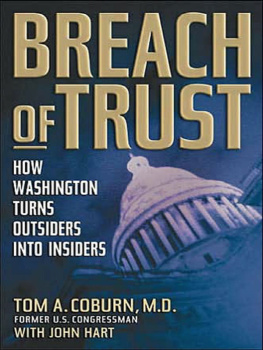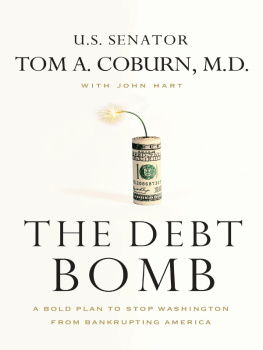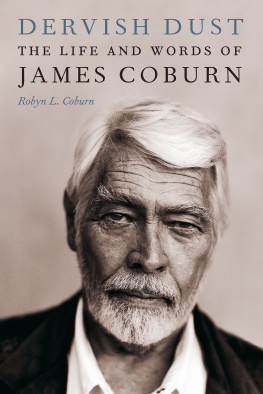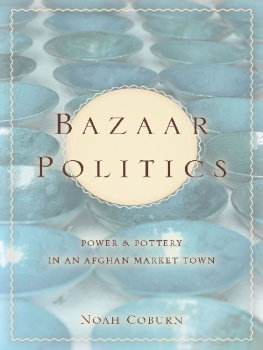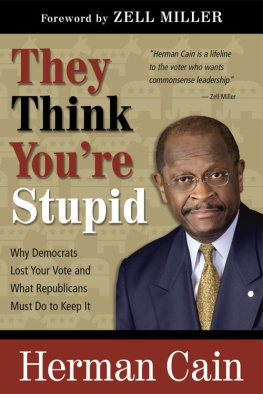BREACH
OFTRUST
How Washington Turns Outsiders into Insiders
TOM A. COBURN, M.D.
with
JOHN HART

Copyright 2003 by Tom A. Coburn, M.D.
All rights reserved. No portion of this book may be reproduced, stored in a retrieval system, or transmitted in any form or by any meanselectronic, mechanical, photocopy, recording, scanning, or otherexcept for brief quotations in critical reviews or articles, without the prior written permission of the publisher.
Published in Nashville, Tennessee, by WND Books.
Published in association with Yates & Yates, LLP, Attorneys and Counselors, Orange, California.
Library of Congress Cataloging-in-Publication Data
Coburn, Tom A.
Breach of trust : how Washington turns outsiders into insiders / Tom A.
Coburn with John Hart.
p. cm.
ISBN 0-7852-6220-2
1. BureaucracyUnited States. 2. Public administrationUnited States.
I. Title.
JK421.C583 2003
328.73'092dc21 2003013214
CIP
Printed in the United States of America
03 04 05 06 07 BVG 5 4 3 2 1
To all of our children and grandchildren whose futures have been mortgaged by Congresses that have forsaken the Constitution and its design for limited government. Their future, and the future of this nation, hinges upon our ability to regain the wisdom of our foundersa wisdom informed by history and rooted in Truths beyond party and ideology.
To the true public servants in Congress who have honored their oath of office by defending the Constitution and its ideals of limited government.
To my staff who worked tirelessly while I served in Congress. I thank you immensely and dedicate this work to you as a reflection of the purpose of your service.
To John Shadegg, Mark Sanford, Mark Souder, Matt Salmon, Walter Jones, Lindsey Graham, Sue Myrick, and Gil Gutknecht for their consistent courage as well as their friendship.
To Zack Wamp, Bart Stupak, Mike Doyle, Steve Largent, and John Baldacci who became some of the best friends I have ever known. Your loyal friendship and accountability made it possible for me to serve in a way in which I could be proud.
To my father, O. W. Coburn, who, with an eighth-grade education, worked hard and enjoyed the benefits of the American free enterprise system. His chances of success in todays government-regulated and controlled environment would have been several orders of magnitude less likely. It was his example that has led me at every level to challenge the infringement of our rights as free people by a government that is increasingly straying from our founders vision.
Lastly, to my loving wife Carolyn who has put up with six years of Congress and the completion of this book. I say an eternal thank you!
CONTENTS
by Robert D. Novak
I N THE NEARLY HALF CENTURY that I have been observing the Washington scene and writing and talking about it, I doubt anything has delighted me more than Dr. Tom Coburn of Muskogee, Okla., telling the Congressional establishment to go stuff it.
It happened early in 1998, as Coburn was beginning his third year as a member of the House of Representatives. He had always intended to maintain his medical practice while serving in Congress. From the start, he had returned home every weekend to Muskogee to deliver babies200 of them in the first three years.
Since 1997, however, the House Ethics Committee had been pondering a complaint, filed by colleagues, that Coburn was violating House rules. After a years procrastination, the committee ruled that delivering babies was a fiduciary relationshipakin to practicing law or selling insurance and real estate. Thus, his colleagues ruled, Coburn was in violation of a 1989 law restricting outside income by members of Congress.
That decision did not faze Dr. Coburn in the slightest. Im not going to abide by what theyve said, he said. If I cant resolve it I wont be here, period. He went on to declare: Im going to continue practicing medicine regardless of what they say. Faced with that determination, the House ethicists backed down.
It would not have broken Coburns heart if he had returned home to Oklahoma in 1998. That would have advanced his timetable by three years. He had pledged to serve only three two-year terms, which meant 2000 would be his last year in Congress. That pledge and his refusal to abandon his medical practice makes Coburn the purest citizen legislator that I have ever seen in a Congress dominated by long-serving professional politicians.
That is why this revealing book is so important for Americans, who should understand the corruption of their national legislative branch. Tom Coburns story is the modern version of Mr. Smith Goes toWashington. In the melodramatic climax of the Frank Capra movie, the idealistic young Sen. Smith (played by Jimmy Stewart) appears to have won an ill-defined victory over corrupt special interests. Real life is more complicated. Coburn left Washington, intrepid and vindicated but unable to really change the status quo on Capitol Hill.
Coburn came to Congress as part of the big and boisterous Republican class of 1994 that won the party control of the House of Representatives for the first time in 40 years. These new legislators were ready to march behind fiery Speaker Newt Gingrich to effect a revolution in government. They were now in Washington, but did not want to be part of Washington.
Few of the rookie House members showed any inclination to settle in by moving their families to the capital. Most had campaigned on what was then the very popular issue of term limits. Several winning RepublicansCoburn among themhad promised to serve only three terms (some pledged four terms). Supposedly, the trend toward domination of the professional politician had ended, and the road back to citizen legislators had begun.
Supposedly, but not really. Even before the 104th Congress convened in January 1995, House Majority Leader-designate Dick Armey mused that term limits might no longer be necessary now that Republicans had miraculously won the Congressional majority. The House roll call votes in 1995 subsequently were rigged so that every Republican had a chance to vote for one version of term limits while no version actually received enough votes to pass. Hypocrisy was the watchword.
As for House members who were self-term-limited, some blatantly ignored their campaign promises. Most notorious was George Nethercutt, who in the state of Washington had defeated Democratic House Speaker Thomas Foley (the first incumbent speaker to be defeated for re-election to the House since before the Civil War) by attacking Foleys law suit against the voters in his state for approving term limits in a referendum.
Some House members who kept their term-limiting promises quickly moved on to a new political venue. Mark Sanford was elected governor of South Carolina. Lindsey Graham was elected to the U.S. Senate from South Carolina. Matt Salmon was defeated for governor of Arizona. Tom Coburn was among the few who returned to his pre-Congressional profession. He was a genuine citizen legislator.
I suppose the most extreme form of citizen legislator I have encountered was a retired farmer from Norfolk,Nebraska named William Prudy, who served in the 1957 session of the Nebraska unicameral legislature (which I covered for the Associated Press in my first taste of legislative reporting). In his campaign, Purdy had promised to make no speeches on the floor of the legislature, to introduce no bills, to vote against any new expenditure or extension of government-and to serve only one two-year term. He fulfilled each pledge to the letter. I then thought of Purdy as an eccentric, but over the years I have come to regard him as a wise man.
Next page
